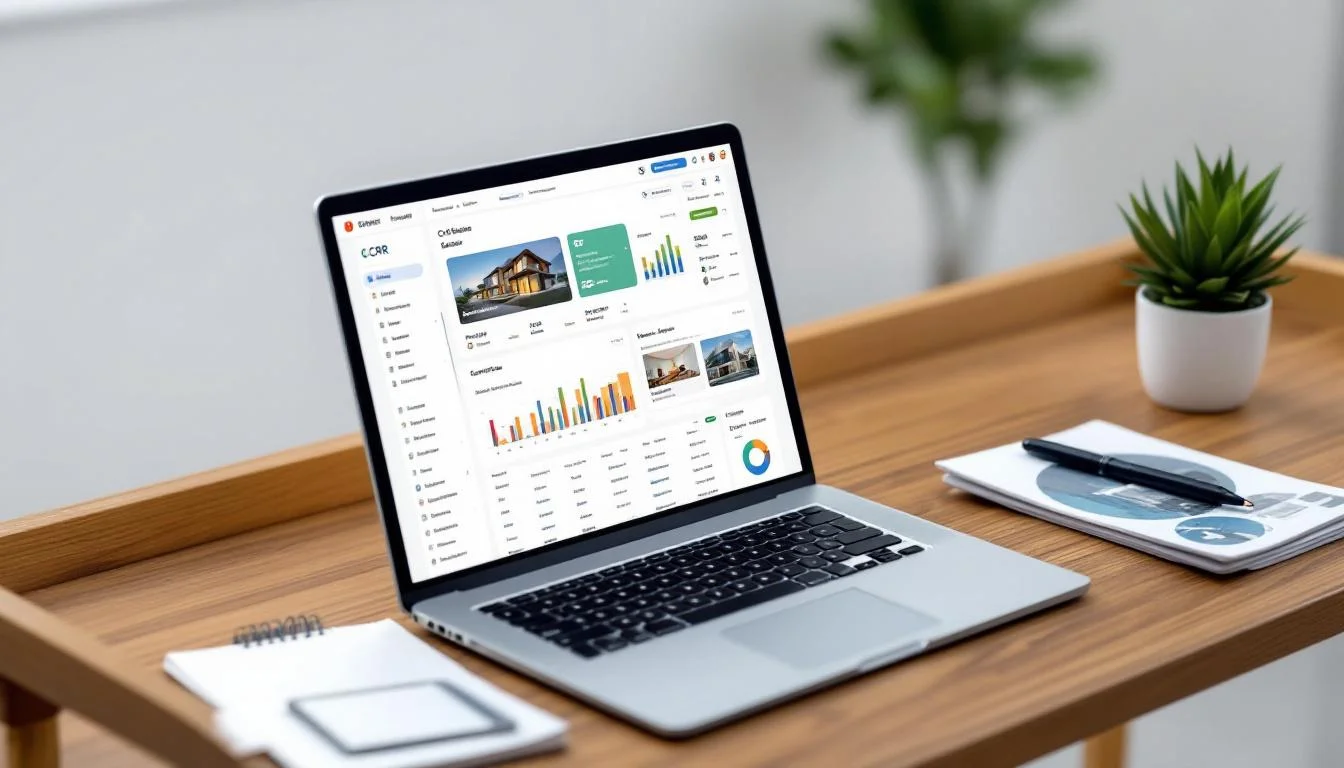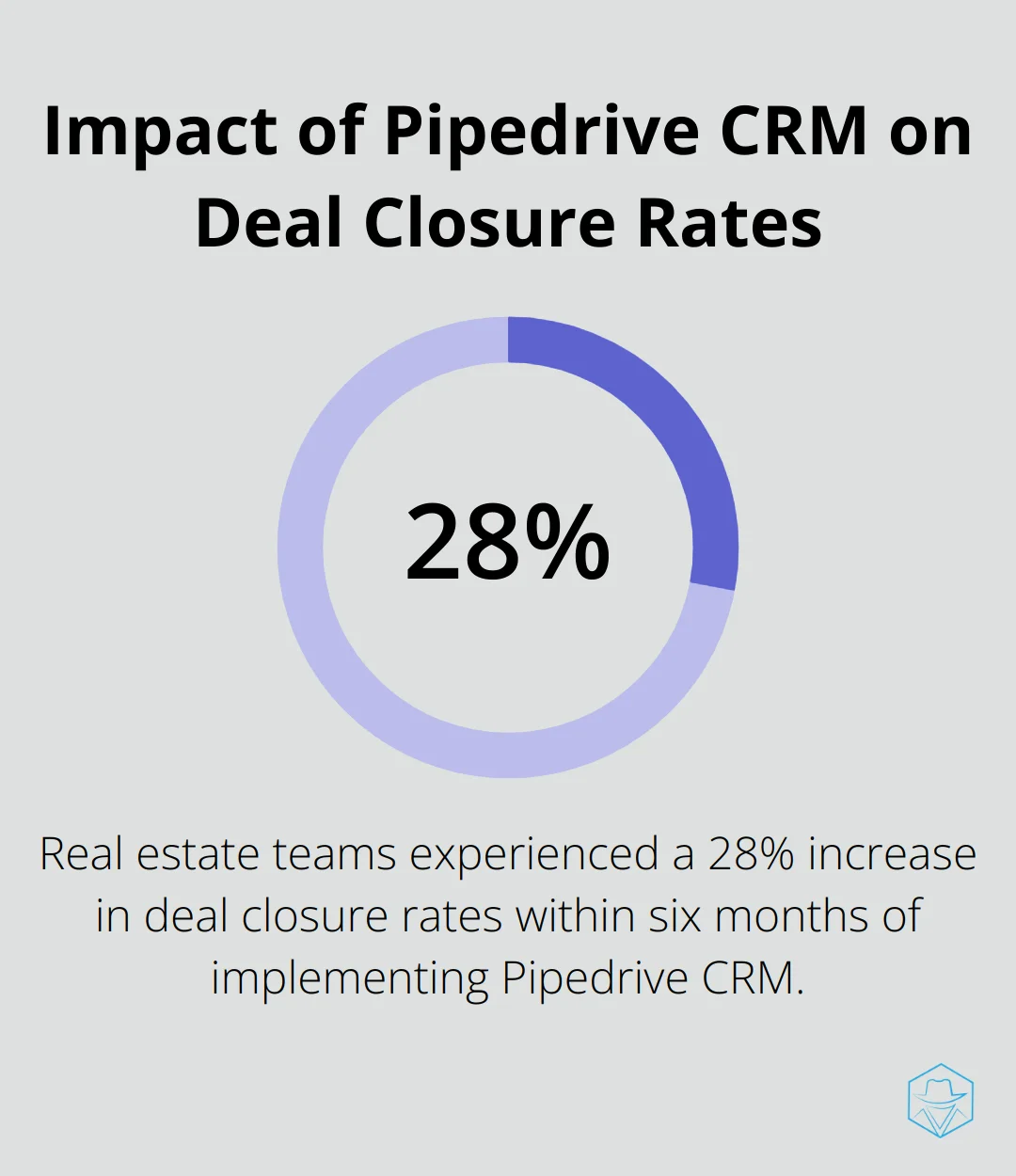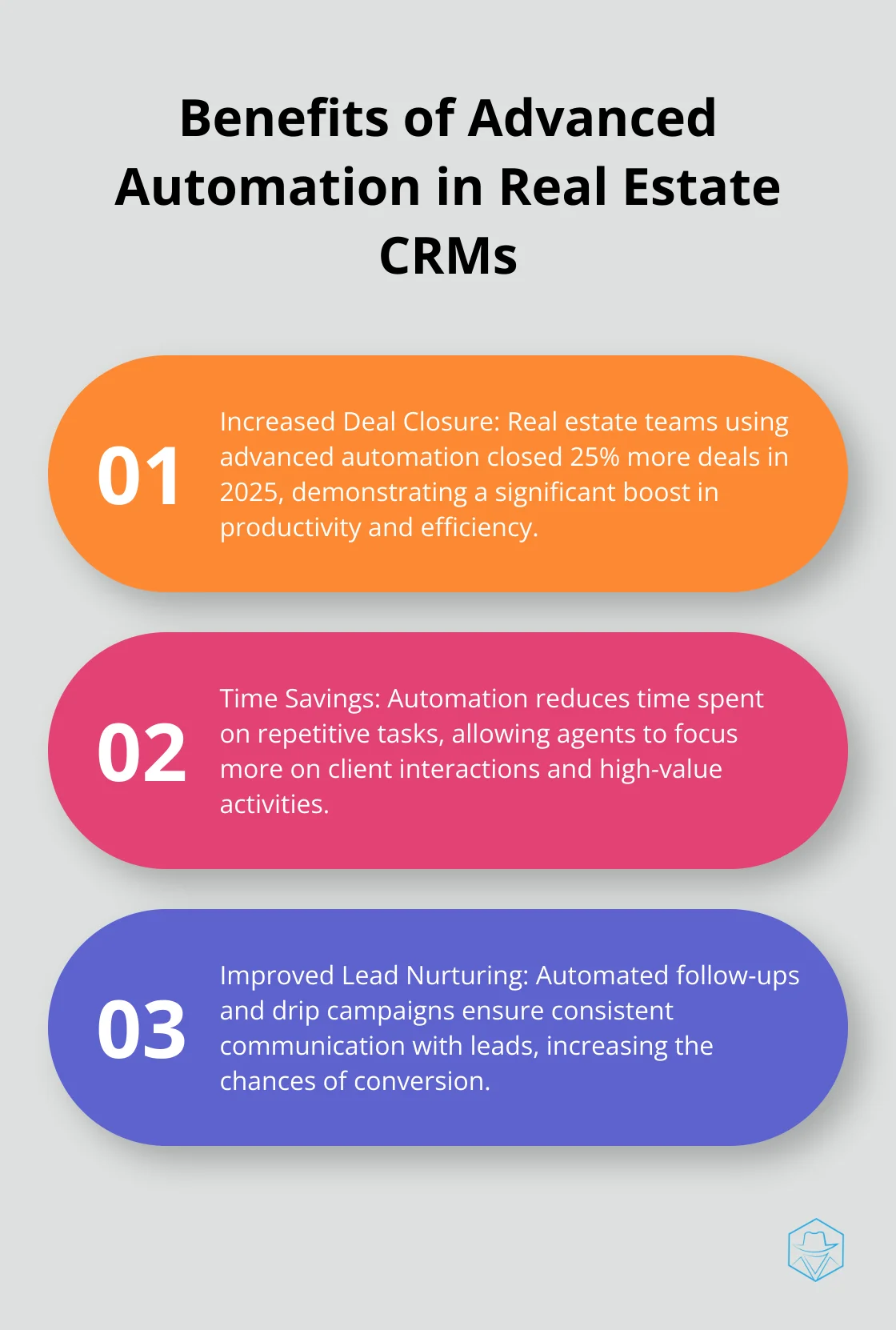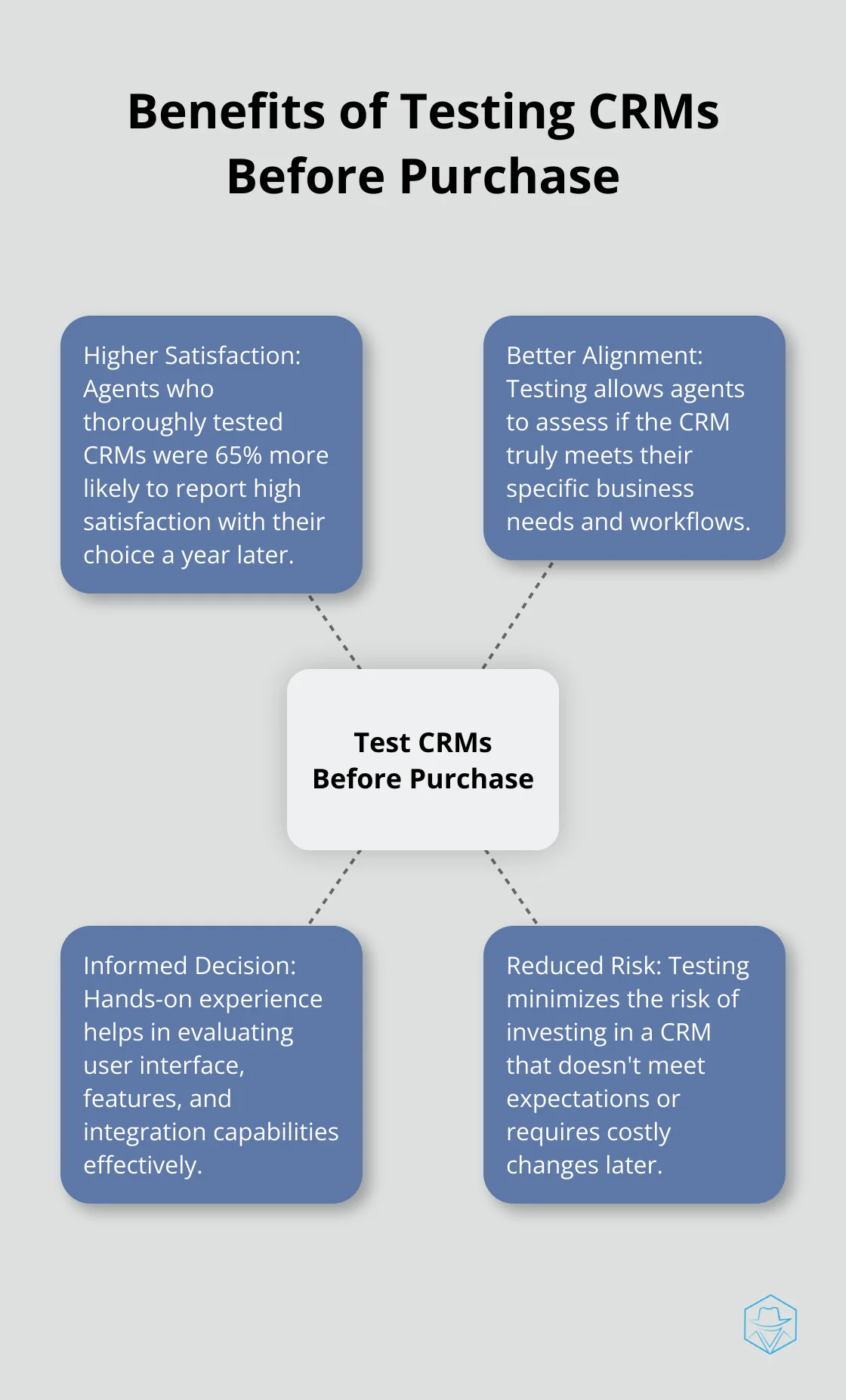Best CRM for Real Estate: Enhance Your Property Business

At Drop Cowboy, we understand the importance of efficient client management in the real estate industry. Finding the best CRM for real estate can significantly boost your property business and streamline your operations.
In this post, we’ll explore top CRM options tailored for real estate professionals and highlight key features to look for. We’ll also guide you through the process of selecting the right CRM for your specific needs.
Top CRM Solutions for Real Estate Success
The competitive world of real estate demands a robust Customer Relationship Management (CRM) system. We’ve analyzed the market and identified five top-tier CRM solutions that cater specifically to real estate professionals. Let’s explore what makes each of these options stand out.
Salesforce Real Estate Cloud: Power and Customization
Salesforce Real Estate Cloud offers unparalleled customization and scalability. It handles complex real estate transactions and large volumes of data with ease. The platform excels in lead management, allowing agents to track potential clients from initial contact through to closing. A 2024 report by Real Estate Technology Insights revealed that agencies using Salesforce experienced an average 23% increase in lead conversion rates.
HubSpot CRM: User-Friendly and Affordable
HubSpot CRM boasts an intuitive interface and a robust free plan, making it an excellent choice for small to medium-sized real estate businesses. Its strength lies in marketing automation and lead nurturing. Inman News found that real estate agents using HubSpot’s email marketing tools experienced a 15% higher open rate compared to industry averages.
Propertybase: Tailored for Real Estate
Propertybase (now part of Lone Wolf Technologies) caters specifically to real estate professionals. It integrates seamlessly with MLS listings and offers powerful transaction management tools. Users report saving an average of 5 hours per week on administrative tasks (according to a survey conducted by the National Association of Realtors in 2025).
Pipedrive: Visual Pipeline Management
Pipedrive stands out with its visual sales pipeline, enabling agents to track deals at a glance. Its mobile app receives praise for its functionality, allowing agents to update information on-the-go. Real estate teams using Pipedrive reported a 28% increase in deal closure rates within the first six months of implementation (as per a case study published by Real Estate Tech News).

Zoho CRM: Affordable Automation
Zoho CRM offers a comprehensive suite of features at a competitive price point. Its AI-powered assistant, Zia, predicts sales and automates routine tasks. Small real estate firms reported up to 30% time savings on lead management processes after implementing Zoho CRM (according to a 2025 survey by Small Business Trends).
While these CRMs offer excellent features, it’s important to note that Drop Cowboy provides complementary services that can enhance your CRM’s effectiveness. Our ringless voicemail and SMS features integrate seamlessly with most CRMs, allowing you to reach clients more effectively and personalize your communication at scale.
As we move forward, let’s examine the key features you should look for in a real estate CRM to ensure you select the best solution for your business needs.
Essential Features for Real Estate CRMs
Real estate professionals need powerful tools to manage their business effectively. A robust CRM system can make all the difference. Let’s explore the key features that top-performing real estate agents prioritize in their CRM systems.
Robust Contact Management
A real estate CRM must excel at managing contacts and tracking leads. The best systems allow you to store detailed client information, including property preferences, communication history, and important dates. The National Association of Realtors reported in 2025 that agents using CRMs with advanced contact management features experienced a 40% increase in repeat business.
Seamless Property Listing Integration
Your CRM should integrate smoothly with MLS listings and property databases. This integration saves time and reduces errors by automatically populating property details. A study by Real Estate Tech Insights found that agents using CRMs with MLS integration reduced their data entry time by 60%, allowing more time for client interactions.
Intelligent Task Automation
Automation plays a vital role in staying on top of follow-ups and nurturing leads. The most effective CRMs offer smart task creation, automated reminders, and drip email campaigns. Real estate teams using advanced automation closed 25% more deals in 2025 (according to a survey by Inman News).

Mobile-First Design
In the fast-paced world of real estate, mobile accessibility is non-negotiable. Your CRM should offer a fully-featured mobile app that allows you to update information, access documents, and communicate with clients on the go. The Real Estate Technology Institute found that agents using mobile-optimized CRMs responded to leads 37% faster than those without mobile access.
Comprehensive Analytics
Data-driven decision-making is key to scaling your real estate business. The best CRMs provide in-depth reporting and analytics on lead sources, conversion rates, and ROI. A 2025 report by Real Estate Business Analytics showed that firms leveraging CRM analytics increased their annual revenue by an average of 18%.
These features form the foundation of an effective real estate CRM. However, the true power of a CRM lies in its ability to integrate with other essential tools. For example, combining your CRM with advanced communication platforms (like ringless voicemail and SMS services) can significantly enhance your outreach capabilities and lead conversion rates.
As you evaluate different CRM options, keep these essential features in mind. They will help you streamline your operations, nurture leads more effectively, and ultimately close more deals. Now, let’s move on to the process of selecting the right CRM for your specific real estate business needs.
How to Choose the Right CRM for Your Real Estate Business
Define Your Business Objectives
Start by outlining your specific business goals. Do you want to improve lead generation, streamline transaction management, or enhance client communication? A 2025 survey by the National Association of Realtors found that agents who aligned their CRM choice with specific business objectives increased their productivity by 35% within the first year.
Evaluate Your Budget and Growth Plans
Consider your current budget and future growth plans. While a free CRM might seem attractive, it may limit your capabilities as you scale. Mid-sized agencies that invested in scalable CRMs from the start grew their client base 2.5 times faster than those who started with free options and later upgraded (according to Real Estate Tech Insights).
Prioritize User Experience
The ease of use of a CRM can make or break its adoption within your team. Look for intuitive interfaces and comprehensive training resources. CRMs with high user satisfaction scores led to 28% higher usage rates among real estate teams, directly correlating with improved lead conversion (Inman News, 2025).
Assess Integration Capabilities
Your CRM should integrate seamlessly with your existing tools and workflows. This includes MLS listings, email marketing platforms, and communication tools. Real estate firms using fully integrated CRM systems reduced their administrative tasks by 40% (Real Estate Business Analytics, 2025).
Test Drive Before Committing
Always take advantage of free trials and demos. This hands-on experience will help you assess whether a CRM truly meets your needs. Agents who thoroughly tested CRMs before purchase were 65% more likely to report high satisfaction with their choice a year later (Real Estate Technology Institute).

Final Thoughts
The best CRM for real estate can transform your property business. We explored top options like Salesforce Real Estate Cloud, HubSpot CRM, and Propertybase, each offering unique strengths to meet diverse real estate needs. These CRMs cater to various aspects of real estate operations, from powerful customization to user-friendly interfaces and specialized features.
A well-implemented CRM will boost productivity, enhance client relationships, and drive revenue growth. It empowers you to make data-driven decisions, personalize client interactions, and stay ahead in a competitive market. The right CRM aligns with your specific needs, integrates seamlessly with existing tools, and scales with your business growth.
At Drop Cowboy, we understand the importance of effective communication in real estate. Our ringless voicemail and SMS services can complement your CRM strategy by enhancing your outreach capabilities. You can create a powerful ecosystem that drives engagement and conversions (by integrating these tools with your chosen CRM).
blog-dropcowboy-com
Related posts

May 27, 2025
Bing Ads vs Google Ads: Which Is Better for Your Business?
Compare Bing Ads vs Google Ads to find the best fit for your business, offering insights, pros, and cons for smarter marketing decisions.

June 16, 2025
Voicemail Drop Strategies to Maximize Your Reach With Targeted Tips
In today’s fast-paced world, reaching potential customers can be a challenge. According to WebFX, 80% of all sales calls go straight to voicemail. With more people screening their calls, leaving a voicemail has become a critical part of the sales process. Using a voicemail drop as part of your voicemail marketing strategy can ensure your message gets heard. This […]

August 13, 2025
Vm drop
Boost engagement with effective Vm Drop strategies. Learn how to maximize outreach, improve conversions, and supercharge your communication efforts.

March 7, 2025
Text Marketing Best Practices: A Comprehensive Guide
Explore text marketing best practices with practical tips, tools, and data to boost engagement and drive successful campaigns. Maximize your strategy now!

April 3, 2025
Automation in Content Marketing: Tips and Tricks
Boost efficiency with automation content marketing tips. Discover strategies, tools, and trends to streamline your efforts and enhance productivity.

August 22, 2025
Voice AI Applications in Modern Marketing Strategies
Discover how Voice AI revolutionizes marketing, enhances customer engagement, and streamlines interactions. Learn to leverage this tech for better results.